Professional Skills: Academic Integrity and Professionalism in Finance
VerifiedAdded on 2023/06/16
|7
|1332
|452
Essay
AI Summary
This essay discusses the significance of academic integrity in fostering professionalism within the business and finance sectors. It begins by defining academic plagiarism, highlighting various forms such as patchwork, paraphrasing, self-plagiarism, and verbatim plagiarism, and emphasizes the importance of upholding academic integrity in universities to promote original thought and knowledge development. The essay then transitions to defining professionalism, outlining key characteristics like competence, knowledge, integrity, and emotional intelligence. It argues that academic integrity is crucial for developing these professional attributes in students, ultimately enhancing their employability and career prospects by instilling values of respect, conscientiousness, and ethical conduct. The conclusion reinforces the idea that academic integrity cultivates essential professional skills, preparing students for successful careers in business and finance.

Professional skills
for business and
finance
1
for business and
finance
1
Paraphrase This Document
Need a fresh take? Get an instant paraphrase of this document with our AI Paraphraser
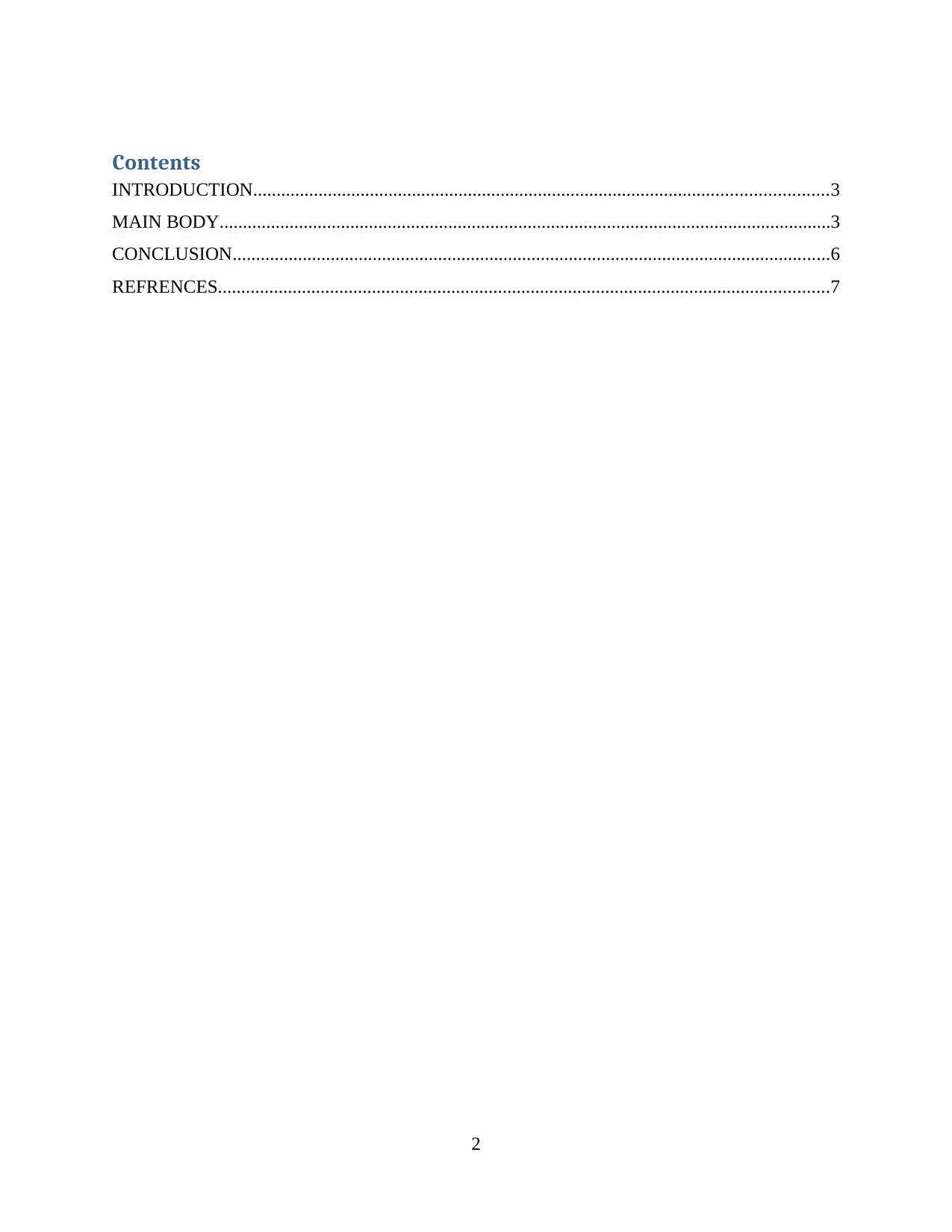
Contents
INTRODUCTION...........................................................................................................................3
MAIN BODY...................................................................................................................................3
CONCLUSION................................................................................................................................6
REFRENCES...................................................................................................................................7
2
INTRODUCTION...........................................................................................................................3
MAIN BODY...................................................................................................................................3
CONCLUSION................................................................................................................................6
REFRENCES...................................................................................................................................7
2
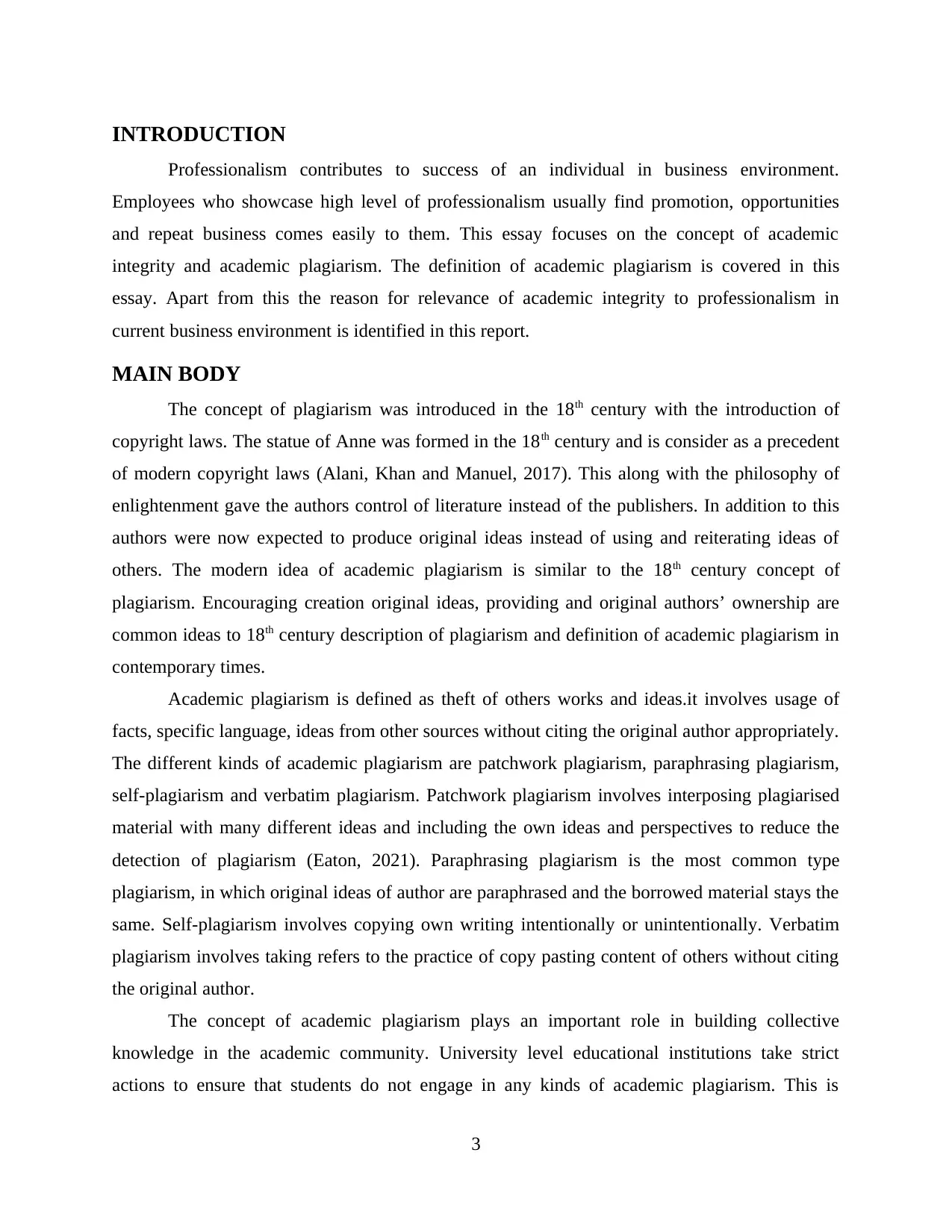
INTRODUCTION
Professionalism contributes to success of an individual in business environment.
Employees who showcase high level of professionalism usually find promotion, opportunities
and repeat business comes easily to them. This essay focuses on the concept of academic
integrity and academic plagiarism. The definition of academic plagiarism is covered in this
essay. Apart from this the reason for relevance of academic integrity to professionalism in
current business environment is identified in this report.
MAIN BODY
The concept of plagiarism was introduced in the 18th century with the introduction of
copyright laws. The statue of Anne was formed in the 18th century and is consider as a precedent
of modern copyright laws (Alani, Khan and Manuel, 2017). This along with the philosophy of
enlightenment gave the authors control of literature instead of the publishers. In addition to this
authors were now expected to produce original ideas instead of using and reiterating ideas of
others. The modern idea of academic plagiarism is similar to the 18th century concept of
plagiarism. Encouraging creation original ideas, providing and original authors’ ownership are
common ideas to 18th century description of plagiarism and definition of academic plagiarism in
contemporary times.
Academic plagiarism is defined as theft of others works and ideas.it involves usage of
facts, specific language, ideas from other sources without citing the original author appropriately.
The different kinds of academic plagiarism are patchwork plagiarism, paraphrasing plagiarism,
self-plagiarism and verbatim plagiarism. Patchwork plagiarism involves interposing plagiarised
material with many different ideas and including the own ideas and perspectives to reduce the
detection of plagiarism (Eaton, 2021). Paraphrasing plagiarism is the most common type
plagiarism, in which original ideas of author are paraphrased and the borrowed material stays the
same. Self-plagiarism involves copying own writing intentionally or unintentionally. Verbatim
plagiarism involves taking refers to the practice of copy pasting content of others without citing
the original author.
The concept of academic plagiarism plays an important role in building collective
knowledge in the academic community. University level educational institutions take strict
actions to ensure that students do not engage in any kinds of academic plagiarism. This is
3
Professionalism contributes to success of an individual in business environment.
Employees who showcase high level of professionalism usually find promotion, opportunities
and repeat business comes easily to them. This essay focuses on the concept of academic
integrity and academic plagiarism. The definition of academic plagiarism is covered in this
essay. Apart from this the reason for relevance of academic integrity to professionalism in
current business environment is identified in this report.
MAIN BODY
The concept of plagiarism was introduced in the 18th century with the introduction of
copyright laws. The statue of Anne was formed in the 18th century and is consider as a precedent
of modern copyright laws (Alani, Khan and Manuel, 2017). This along with the philosophy of
enlightenment gave the authors control of literature instead of the publishers. In addition to this
authors were now expected to produce original ideas instead of using and reiterating ideas of
others. The modern idea of academic plagiarism is similar to the 18th century concept of
plagiarism. Encouraging creation original ideas, providing and original authors’ ownership are
common ideas to 18th century description of plagiarism and definition of academic plagiarism in
contemporary times.
Academic plagiarism is defined as theft of others works and ideas.it involves usage of
facts, specific language, ideas from other sources without citing the original author appropriately.
The different kinds of academic plagiarism are patchwork plagiarism, paraphrasing plagiarism,
self-plagiarism and verbatim plagiarism. Patchwork plagiarism involves interposing plagiarised
material with many different ideas and including the own ideas and perspectives to reduce the
detection of plagiarism (Eaton, 2021). Paraphrasing plagiarism is the most common type
plagiarism, in which original ideas of author are paraphrased and the borrowed material stays the
same. Self-plagiarism involves copying own writing intentionally or unintentionally. Verbatim
plagiarism involves taking refers to the practice of copy pasting content of others without citing
the original author.
The concept of academic plagiarism plays an important role in building collective
knowledge in the academic community. University level educational institutions take strict
actions to ensure that students do not engage in any kinds of academic plagiarism. This is
3
⊘ This is a preview!⊘
Do you want full access?
Subscribe today to unlock all pages.

Trusted by 1+ million students worldwide
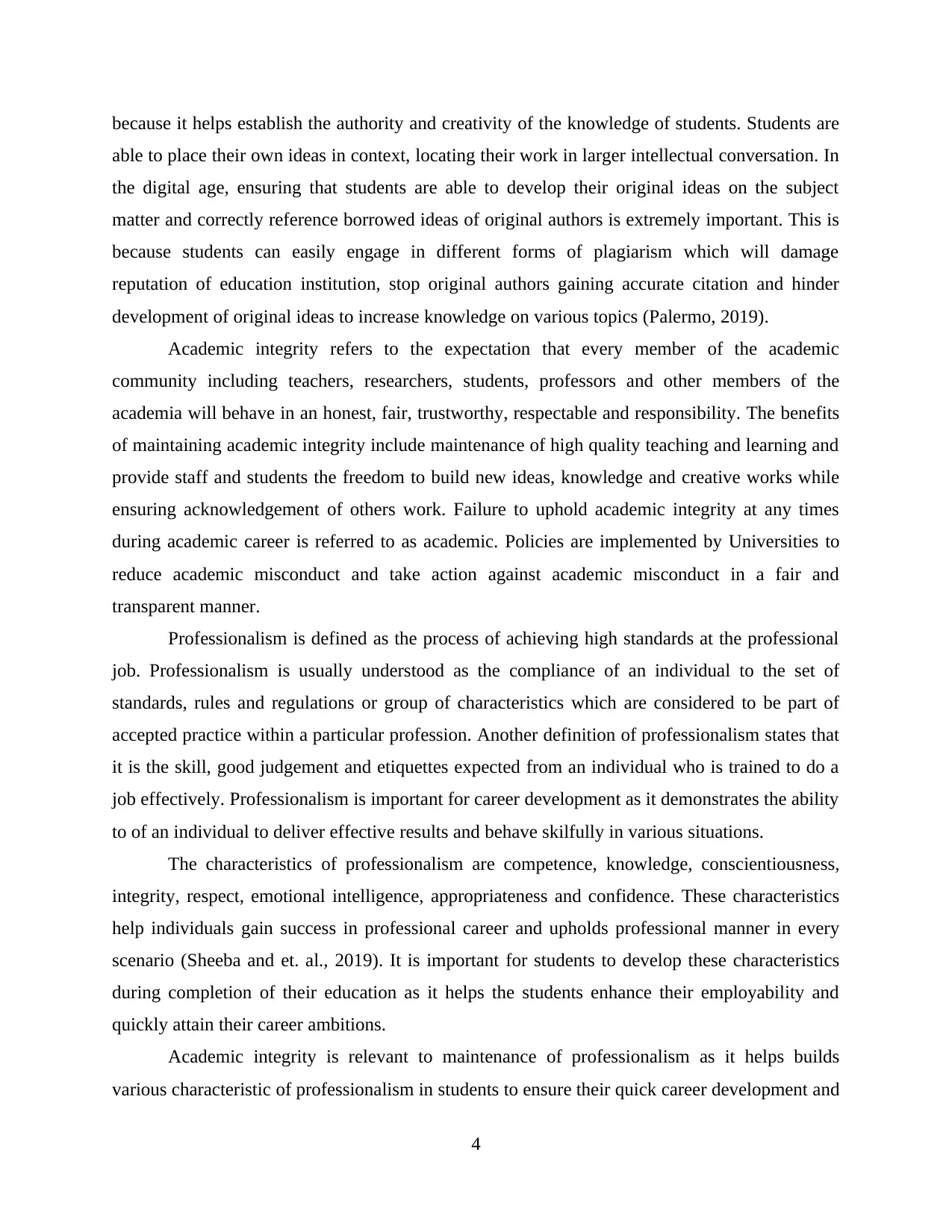
because it helps establish the authority and creativity of the knowledge of students. Students are
able to place their own ideas in context, locating their work in larger intellectual conversation. In
the digital age, ensuring that students are able to develop their original ideas on the subject
matter and correctly reference borrowed ideas of original authors is extremely important. This is
because students can easily engage in different forms of plagiarism which will damage
reputation of education institution, stop original authors gaining accurate citation and hinder
development of original ideas to increase knowledge on various topics (Palermo, 2019).
Academic integrity refers to the expectation that every member of the academic
community including teachers, researchers, students, professors and other members of the
academia will behave in an honest, fair, trustworthy, respectable and responsibility. The benefits
of maintaining academic integrity include maintenance of high quality teaching and learning and
provide staff and students the freedom to build new ideas, knowledge and creative works while
ensuring acknowledgement of others work. Failure to uphold academic integrity at any times
during academic career is referred to as academic. Policies are implemented by Universities to
reduce academic misconduct and take action against academic misconduct in a fair and
transparent manner.
Professionalism is defined as the process of achieving high standards at the professional
job. Professionalism is usually understood as the compliance of an individual to the set of
standards, rules and regulations or group of characteristics which are considered to be part of
accepted practice within a particular profession. Another definition of professionalism states that
it is the skill, good judgement and etiquettes expected from an individual who is trained to do a
job effectively. Professionalism is important for career development as it demonstrates the ability
to of an individual to deliver effective results and behave skilfully in various situations.
The characteristics of professionalism are competence, knowledge, conscientiousness,
integrity, respect, emotional intelligence, appropriateness and confidence. These characteristics
help individuals gain success in professional career and upholds professional manner in every
scenario (Sheeba and et. al., 2019). It is important for students to develop these characteristics
during completion of their education as it helps the students enhance their employability and
quickly attain their career ambitions.
Academic integrity is relevant to maintenance of professionalism as it helps builds
various characteristic of professionalism in students to ensure their quick career development and
4
able to place their own ideas in context, locating their work in larger intellectual conversation. In
the digital age, ensuring that students are able to develop their original ideas on the subject
matter and correctly reference borrowed ideas of original authors is extremely important. This is
because students can easily engage in different forms of plagiarism which will damage
reputation of education institution, stop original authors gaining accurate citation and hinder
development of original ideas to increase knowledge on various topics (Palermo, 2019).
Academic integrity refers to the expectation that every member of the academic
community including teachers, researchers, students, professors and other members of the
academia will behave in an honest, fair, trustworthy, respectable and responsibility. The benefits
of maintaining academic integrity include maintenance of high quality teaching and learning and
provide staff and students the freedom to build new ideas, knowledge and creative works while
ensuring acknowledgement of others work. Failure to uphold academic integrity at any times
during academic career is referred to as academic. Policies are implemented by Universities to
reduce academic misconduct and take action against academic misconduct in a fair and
transparent manner.
Professionalism is defined as the process of achieving high standards at the professional
job. Professionalism is usually understood as the compliance of an individual to the set of
standards, rules and regulations or group of characteristics which are considered to be part of
accepted practice within a particular profession. Another definition of professionalism states that
it is the skill, good judgement and etiquettes expected from an individual who is trained to do a
job effectively. Professionalism is important for career development as it demonstrates the ability
to of an individual to deliver effective results and behave skilfully in various situations.
The characteristics of professionalism are competence, knowledge, conscientiousness,
integrity, respect, emotional intelligence, appropriateness and confidence. These characteristics
help individuals gain success in professional career and upholds professional manner in every
scenario (Sheeba and et. al., 2019). It is important for students to develop these characteristics
during completion of their education as it helps the students enhance their employability and
quickly attain their career ambitions.
Academic integrity is relevant to maintenance of professionalism as it helps builds
various characteristic of professionalism in students to ensure their quick career development and
4
Paraphrase This Document
Need a fresh take? Get an instant paraphrase of this document with our AI Paraphraser
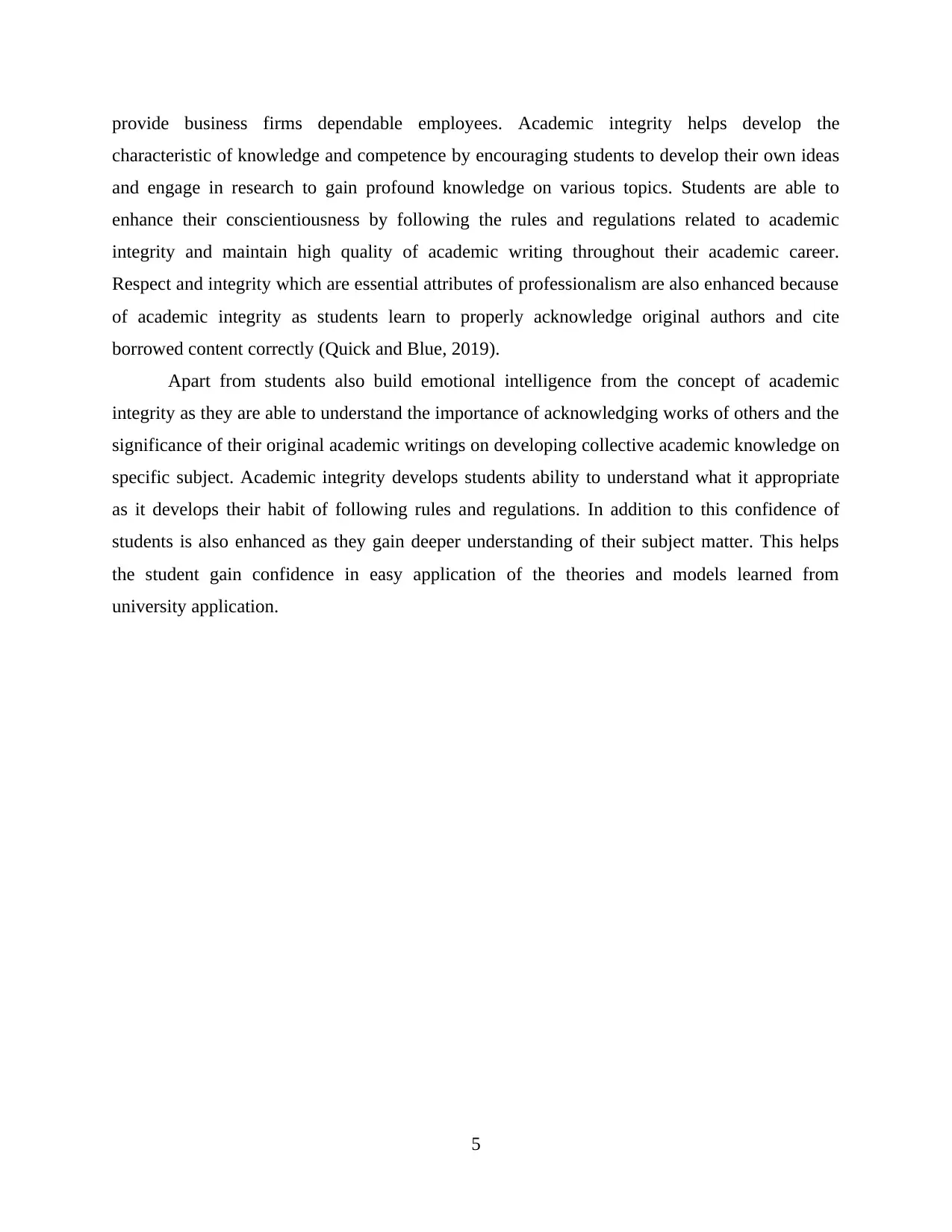
provide business firms dependable employees. Academic integrity helps develop the
characteristic of knowledge and competence by encouraging students to develop their own ideas
and engage in research to gain profound knowledge on various topics. Students are able to
enhance their conscientiousness by following the rules and regulations related to academic
integrity and maintain high quality of academic writing throughout their academic career.
Respect and integrity which are essential attributes of professionalism are also enhanced because
of academic integrity as students learn to properly acknowledge original authors and cite
borrowed content correctly (Quick and Blue, 2019).
Apart from students also build emotional intelligence from the concept of academic
integrity as they are able to understand the importance of acknowledging works of others and the
significance of their original academic writings on developing collective academic knowledge on
specific subject. Academic integrity develops students ability to understand what it appropriate
as it develops their habit of following rules and regulations. In addition to this confidence of
students is also enhanced as they gain deeper understanding of their subject matter. This helps
the student gain confidence in easy application of the theories and models learned from
university application.
5
characteristic of knowledge and competence by encouraging students to develop their own ideas
and engage in research to gain profound knowledge on various topics. Students are able to
enhance their conscientiousness by following the rules and regulations related to academic
integrity and maintain high quality of academic writing throughout their academic career.
Respect and integrity which are essential attributes of professionalism are also enhanced because
of academic integrity as students learn to properly acknowledge original authors and cite
borrowed content correctly (Quick and Blue, 2019).
Apart from students also build emotional intelligence from the concept of academic
integrity as they are able to understand the importance of acknowledging works of others and the
significance of their original academic writings on developing collective academic knowledge on
specific subject. Academic integrity develops students ability to understand what it appropriate
as it develops their habit of following rules and regulations. In addition to this confidence of
students is also enhanced as they gain deeper understanding of their subject matter. This helps
the student gain confidence in easy application of the theories and models learned from
university application.
5
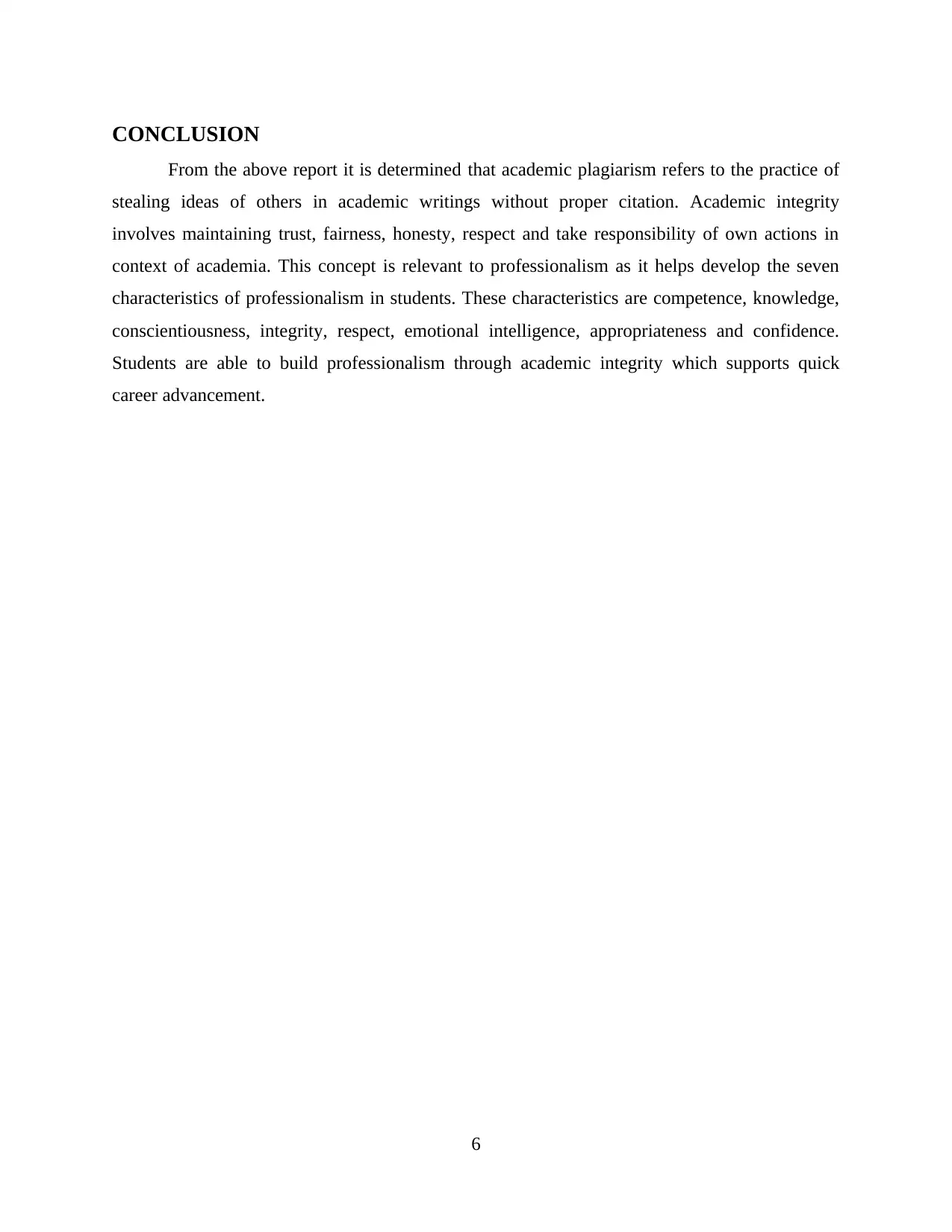
CONCLUSION
From the above report it is determined that academic plagiarism refers to the practice of
stealing ideas of others in academic writings without proper citation. Academic integrity
involves maintaining trust, fairness, honesty, respect and take responsibility of own actions in
context of academia. This concept is relevant to professionalism as it helps develop the seven
characteristics of professionalism in students. These characteristics are competence, knowledge,
conscientiousness, integrity, respect, emotional intelligence, appropriateness and confidence.
Students are able to build professionalism through academic integrity which supports quick
career advancement.
6
From the above report it is determined that academic plagiarism refers to the practice of
stealing ideas of others in academic writings without proper citation. Academic integrity
involves maintaining trust, fairness, honesty, respect and take responsibility of own actions in
context of academia. This concept is relevant to professionalism as it helps develop the seven
characteristics of professionalism in students. These characteristics are competence, knowledge,
conscientiousness, integrity, respect, emotional intelligence, appropriateness and confidence.
Students are able to build professionalism through academic integrity which supports quick
career advancement.
6
⊘ This is a preview!⊘
Do you want full access?
Subscribe today to unlock all pages.

Trusted by 1+ million students worldwide
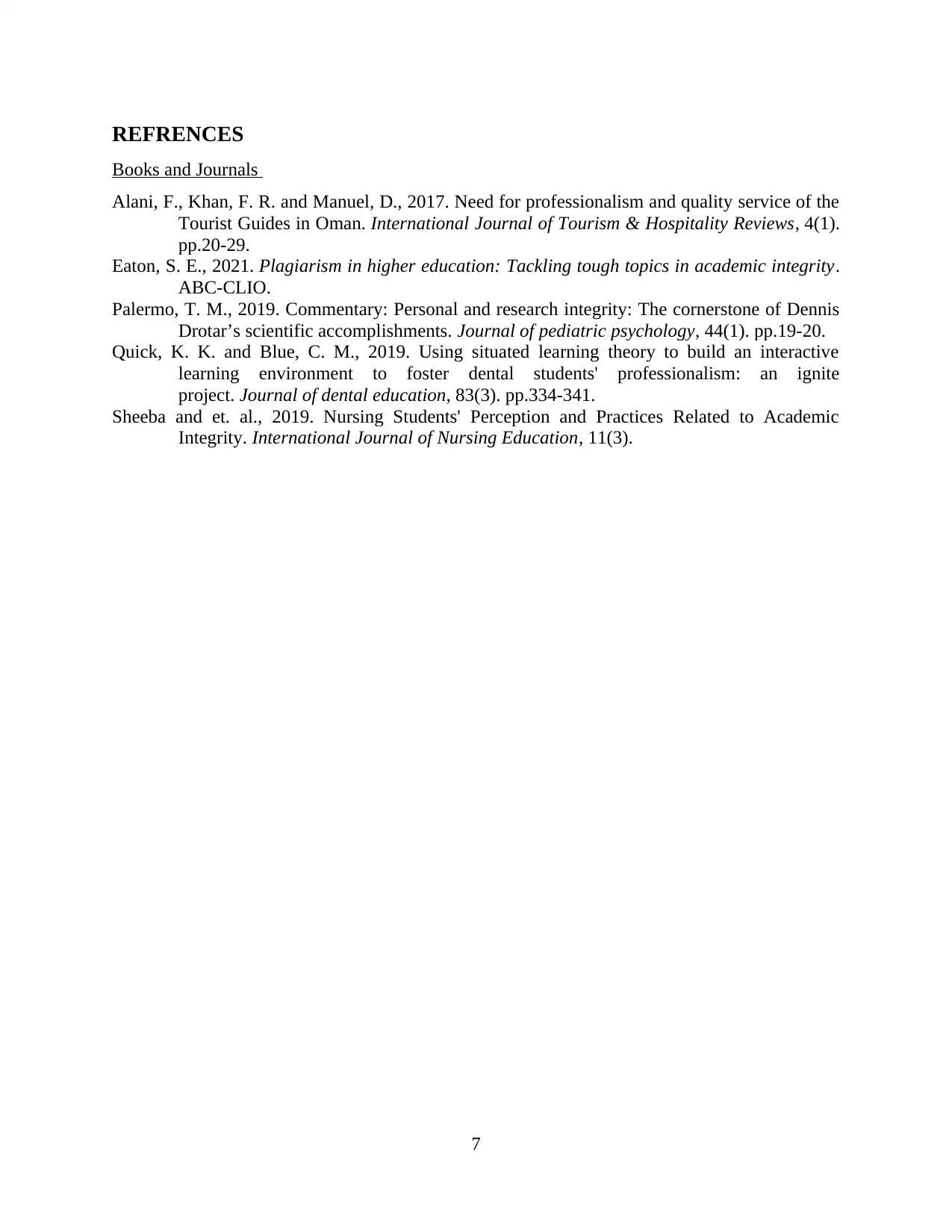
REFRENCES
Books and Journals
Alani, F., Khan, F. R. and Manuel, D., 2017. Need for professionalism and quality service of the
Tourist Guides in Oman. International Journal of Tourism & Hospitality Reviews, 4(1).
pp.20-29.
Eaton, S. E., 2021. Plagiarism in higher education: Tackling tough topics in academic integrity.
ABC-CLIO.
Palermo, T. M., 2019. Commentary: Personal and research integrity: The cornerstone of Dennis
Drotar’s scientific accomplishments. Journal of pediatric psychology, 44(1). pp.19-20.
Quick, K. K. and Blue, C. M., 2019. Using situated learning theory to build an interactive
learning environment to foster dental students' professionalism: an ignite
project. Journal of dental education, 83(3). pp.334-341.
Sheeba and et. al., 2019. Nursing Students' Perception and Practices Related to Academic
Integrity. International Journal of Nursing Education, 11(3).
7
Books and Journals
Alani, F., Khan, F. R. and Manuel, D., 2017. Need for professionalism and quality service of the
Tourist Guides in Oman. International Journal of Tourism & Hospitality Reviews, 4(1).
pp.20-29.
Eaton, S. E., 2021. Plagiarism in higher education: Tackling tough topics in academic integrity.
ABC-CLIO.
Palermo, T. M., 2019. Commentary: Personal and research integrity: The cornerstone of Dennis
Drotar’s scientific accomplishments. Journal of pediatric psychology, 44(1). pp.19-20.
Quick, K. K. and Blue, C. M., 2019. Using situated learning theory to build an interactive
learning environment to foster dental students' professionalism: an ignite
project. Journal of dental education, 83(3). pp.334-341.
Sheeba and et. al., 2019. Nursing Students' Perception and Practices Related to Academic
Integrity. International Journal of Nursing Education, 11(3).
7
1 out of 7
Related Documents
Your All-in-One AI-Powered Toolkit for Academic Success.
+13062052269
info@desklib.com
Available 24*7 on WhatsApp / Email
![[object Object]](/_next/static/media/star-bottom.7253800d.svg)
Unlock your academic potential
Copyright © 2020–2025 A2Z Services. All Rights Reserved. Developed and managed by ZUCOL.




